The Economic & Geopolitical History of Tchad: Part 2
Gaddafi's failed Pan-Africanist Escapade and The Story of How Chad allowed itself to be exploited by a Shady Commodity Trading firm
Last time, we delved into Chad's historical journey, spanning from its pre-colonial era through colonization and early independence. In summary, Chad emerged as a nation shaped by French colonialism, wherein the Northern Muslim slavers coexisted with the Southern non-Muslims they enslaved. The Northern region, largely desert and resistant to French influence, prompted France to impose its values upon the Southern populace.
Upon gaining independence, Chad fell under the leadership of Tombalbaye, whose favoritism towards the South exacerbated existing tensions, leading to severe conflicts between the North and South. Faced with this turmoil, the North formed the rebel group FROLINAT and sought assistance from Libya to overthrow Southern dominance.
Subsequently, Libya, under the leadership of Muammar Gaddafi, began annexing territories in North Chad. Tombalbaye's ineptitude reached such heights that his own allies turned against him, resulting in his assassination. To learn more click on part I:
The Economic & Geopolitical History of Tchad Part 1
Chad is one of those African countries that fills out the “Africa Bingo Card”: Colonialism, Corruption, Civil Wars, Rebellions, Tribalism, Religious Tension, Autocracy, Western Puppeteering, & Famine. Chad, the 5th largest African country, is three times
Below you will see Chad’s economic performance since independence. Chad’s incomes were rising during the oil boom after they found oil, but now Chad’s incomes are half of their peak in 2014.

Félix Malloum (1975—1979) “Mal-loom”
Felix Malloum, a Southern military leader, took over the country after killing Tombalbaye. Due to the ongoing civil war, the country only had 150 miles of paved highway, no railroad, and only sold cotton and beef. The country was suffering from drought when he took office. He tried a couple actions to improve his country.
#1 Inclusive government: Under Malloum’s leadership, efforts were made to foster inclusivity by releasing Northern political prisoners and inviting Northerner Tubus and Arabs to join the government, which helped quell some rebel factions like FROLINAT.
#2 Asserted Sovereignty: Malloum also revoked agreements with Gaddafi, reclaiming the Aouzou Strip, and expelled French forces.
Unfortunately, Malloum kicked out the French too early, because without French protection, Chad was vulnerable to attacks. Gaddafi rearmed the FROLINAT rebels with the latest Soviet weapons and sent in the Libyan military force. By 1976, Libya was reannexing Northern Chad.
Malloum requested help from France and Egypt, where the new President of Egypt, Anwar Sadat, hated Gaddafi. For context, in 1977, Gaddafi invaded Egypt for making peace with Israel after Yom Kippur war and for not merging nations with him.
By 1978, Libya managed to get North & Central Chad. Gaddafi would have conquered the capital if France didn’t instigate Operation Tacoud and send 2500 troops to stop the Libyans and FROLINAT rebels.
In 1978, Malloum established a new constitution, appointing Hissene Habré, a rebel leader from a FROLINAT splinter group - Armed Forces of the North, as Prime Minister to foster Northern representation. However, factional conflicts emerged, leading to Malloum's ousting in 1979 by rebel factions supported by another rebel Goukouni Oueddei. Malloum fled to Nigeria, marking the end of Southern rule in Chad.
Chadian-Libyan War (1978-1987):
Goukouni Oueddei(1979—1982) “Go-ku-nei Wa-day”
Muslim Northerner Goukouni Oueddei, a Pro-Libyan Chadian rebel from a different FROLINAT splinter rebel group - People’s Armed Forces (PAF) became made President. Meanwhile Hissène Habré, the former Prime Minister from an anti-Libyan FROLINAT Chadian rebel faction, army of the North (FAN), was exiled to Sudan.
In 1981, Gaddafi was elated that his guy was finally ruling Chad. So Gaddafi made an offer to annex unite with Chad. Basically Egypt, Sudan, France, America, and other international actors opposed this deal, as in their perspective, this would basically be a blank check for Gaddafi to make a nuclear bomb once he owned the Aouzou strip, a place in Northern Chad that has uranium. In addition, France and America thought this was only the start of Gaddafi’s Pan-African/Pan-Arab expansionism. After all, Gaddafi has tried unifying with Tunisia, Morocco, Algeria, Sudan, Egypt, Iraq and Syria multiple times. (All of them said no).
France did not want Gaddafi to have more territory. France was planning to kill Gaddafi if he annexed Chad or any other African country. So, French President Mitterrand, American President Ronald Reagan, DGSE (French CIA) & the CIA started to support the exiled Prime Minister, Hissène Habré to remove Goukouni Oueddei.
Oueddei was pressured by France to not join a union and told Gaddafi to leave. So Gaddafi left most of Chad except the Aouzou Strip, since Gaddafi wanted the uranium.
Hissène Habré ousted Oueddei for even considering surrendering sovereignty to Libya. Oueddei fled to Libya.
Hissène Habré (1982-1990)
The Organization of African Unity (OAU) recognized Habré ’s authority. Prior to ruling Chad, Habré was initially an ally of Gaddafi and lived in Tripoli for years. But after he was shot by a Libyan police officer & thrown in Libyan jail, he was no longer a solid ally of Gaddafi.
Habré constantly gave anti-Western speeches to the people, but in secrecy he was very pro-France & pro-USA because they wanted to help him retrieve the Aouzou Strip back from Gaddafi.
Reagan, Mitterrand of France, DGSE, and the CIA provided Habré with arms and funds to take back the Aouzou to stop Gaddafi from making a nuclear bomb. France launched Operation Manta, which eventually made France and Libya have a ceasefire in Chad, even though Gaddafi never left the Northern Chad or the Aouzou.
At this point, Gaddafi annexed Northern Chad and made new highways and infrastructure investment. By 1986, Gaddafi tried to kill Habré and annex Chad, seeing the whole country as an extension of France.
Meanwhile, the French & American backed Habré committed crimes against humanity for killing 40K Southern Christian Chadians and Chadian Arabs.
During Hissène Habré's anti-Arab regime in Chad, many Chadian Arabs fled to Darfur, where Muammar Gaddafi exploited their presence to launch attacks. Gaddafi's "Islamic Legion" and “Arab Gathering” militias, comprised of Chadian Arabs, evolved into an Arab supremacist force due to Habré's anti-Arab discriminatory policies. Seeking to expel non-Arab Africans from the Sahel and seize their land, this group eventually transformed into the notorious Janjaweed militia in Sudan, responsible for genocidal violence against Africans in Darfur.
He also had issues with rebellious Southern Christians and pro-Gaddafi Northern Chadian Arabs. He committed mass slaughter of families, called “Black September”. Because Habré was pro-Western, Reagan of US and Mitterrand of France overlooked his numerous abuses.
To stop Gaddafi’s expansionism, France also launched Operation Épervier, bombing Libya's airbase in Northern Chad and supporting Chadians in pushing back Gaddafi. By this point, many pro-Libyan Chadian rebels switched sides to fight for Chad, famously using Toyota land cruisers. Operations were overseen by future Chadian President Idriss Deby. This was dubbed the “Toyota War”.
Chad was bankrupt at this time also, and received a $21M IMF loan and a structural adjustment program, which required removing price controls, fuel subsidies, and privatizing bankrupt state owned firms.
By 1989, the African Organization of African Unity negotiated a ceasefire between Gaddafi and Habré and the Chadian Civil War & the Chadian-Libyan War was finally over. In the negotiation, Libya would leave the Aouzou & North Chad once the International Criminal Court of Justice (ICJ) made a determination.
However, by 1990, Habré was deposed by military officer & Northerner, Idriss Deby, and Habré fled to exile in Senegal. Idriss thought he could do a better job and he thought Habre’s authoritarianism was out-of-control.
During this entire time, your average poor Chadian was suffering thru drought and famine in the mid 80s. In addition, Western oil firms gave up trying to find oil in Chad due to instability. There were plenty of other oil projects in Africa that were more stable to uncover. When Habre left Chad, he stole over $12M. Habre was held to trial at both the International Criminal Court of Justice for slaughtering 40K Chadians.
Idriss Déby (1990-2021) “E-dress Debie”
As you can tell from Idriss’ 31 year rule, he was a “strongman” ruler who managed to survive by quashing rebellions, finding oil, and receiving continuous IMF and World Bank financial assistance.
#1 Winning the Aouzou Strip
By 1994, the ICJ decided 16 to 1, that the borderlands and Aouzou belong to Chad. The Libyan troops left and only in 1994, Chad finally able to be a “free country”. The sad thing is that despite all the fighting over uranium in Aouzou, no uranium has been found yet in that Strip.
#2 The CFA Franc devaluation
Also, in that same year, the International Monetary Fund advised France to devalue the CFA franc by 50%, causing riots across French Africa, including Chad. You might be asking why did the IMF ask France do this?
When we talk about international currencies, currencies have exchange rates. A “strong currency” makes imports for French African countries relatively inexpensive; however, the tradeoff is a “strong currency” also makes French African exporting firms’ products relatively expensive for international buyers to purchase when cheaper alternatives exist. In economics, a short hand for this is that “a strong currency makes products non-competitive”.
A “weak currency” does the opposite, it makes importing more expensive but it helps firms export their products to global markets since they are cheaply priced. In the 90s, the IMF noticed that countries like Japan, Taiwan, South Korea, and China were having amazing export manufacturing growth for having a “weak currency”. So the IMF told France to devalue the CFA franc to help French Africa’s exporting businesses.
This was terrible advice simply because those Asian countries were more relatively food sufficient, by having high agricultural yields, they don’t depend on food imports to survive like French Africa does. Every French African country back in the 90s and still today have terrible crop yields on average. All it did was make commodity exports cheaper, while making food imports more expensive. French Africa was rioting after the devaluation.
#3 Deby’s relationship with Taiwan & China
China has provided Chad with development assistance and infrastructure projects for years, even when Chad was in war. But in 1997, Deby chose Taiwan as “true China” over the Mainland and received $72M in development assistance from Taiwan as a result. Taiwanese firms like Overseas Engineering and Construction Co. developed bridges, roads, and water distribution systems. Taiwan developed a fund for Chad, so teachers could be paid. There was also a Taiwanese agricultural school in Chad. However, by 2006, China lobbied Senegal to make Deby break ties with Taiwan and choose Mainland China as “True China” instead. Since then, China built roads, provided doctors, university scholarships, and an oil refinery for Chadians and trained Chadian petroleum engineers.
#4 Allowing “democracy”, Not Really!
Idriss ended one party rule and allowed multi-party democracy (which was now a new condition to get World Bank loans in the 90s). Idriss won elections, which opponents claim was rigged by France. He continued to win elections and eventually suspended term limits. In 1998, anti-Deby, rebel movements like Movement for Democracy & Justice in Chad began to form. Chadian rebels tried overthrowing him in 2004,2005,2006,2008,2019, and 2021.
#5 Finally Extracting Oil!
Deby was to get American firms to extract oil after British & French firms left. The World Bank & International Finance Corporation has seen over and over again in Africa that African countries use their government owned national oil firms as a black boxes of corruption to enrich themselves, their family, and clique. We have seen this before in my articles on Angola, Algeria, Gabon, Equatorial Guinea, & Nigeria. The World Bank tried to pre-empt this with creating a transparency and poverty reduction goal. In 2000, the World Bank provided $3.7B along with Exxon-Mobil & a group of other oil firms to build a pipeline from Chad to Cameroon. (Chad is landlocked so it needs to partner with a nation with a coast. Cameroon volunteered to transport Chad’s oil since Cameroon gets a royalty fees). The World Bank conditioned that Chad’s state owned oil firm must ensure that oil funds must go into a Sovereign Wealth Fund, public-works projects, roads, agriculture, healthcare, education, and water supplies.
In 2006, Deby decided to ignore making a sovereign wealth fund and added “security” to another sector of oil allocation and used the oil money to mainly bolster up his military, himself, his family, and the military’s coffers. Many people connected to Déby bought luxury condos & penthouses in Montreal. The World Bank was so upset that the terms of the agreement was dishonored so they suspended only $124M loans and froze $125M in assets from Chad unless Chad shapes up. Chad never shaped up as 50% of Chad’s oil budget goes into its military. The World Bank was embarrassed.
That said the oil wealth did go to fuel subsidies, healthcare, and education as well. Life expectancy went up from 47 to 52, infant morality rate went from 100 dead babies per 1000 births to 66 dead babies per 1000 births, and university enrollment went from 1% of the population to 5%. In nearly any health issue you can think of (malaria, respiratory infections, and etc.), deaths have reduced thanks to some oil funds flowing to hospitals.
There are still issues with lack of electricity and poorly paid government workers. Literacy rates are still the same as pre-oil rates.
#6 Chadian-Sudanese War (2005-2010)
Omar Al-Bashir of Sudan’s armed group, the Janjaweed or “Rapid Support Forces” was slaughtering the Black Africans in Darfur, and that genocide led to a invasion of Chad’s borders. Hundreds of thousands of Darfurians fled to Eastern Chad. Déby claimed Al-Bashir is trying to destroy Chad. So Déby started using his oil money to arm Darfurian rebels in Sudan so Al-Bashir couldn’t slaughter them so easily. To retaliate, Al-Bashir used his oil money to fund the anti-Déby Chadian rebel groups “United Front for Democratic Change”, the “Forces for Democracy & Development” and “Rally of Democratic Forces”. Some of Deby’s own family members are in these militias.
This led to a conflict between Chad and Sudan. Déby allowed Western journalists and aid workers to pass through Chad to get to Darfur, so NYT could document Al-Bashir’s genocide in Darfur. By 2010, both countries were suffering through a famine and the conflict between them stopped due to international pressure.
#7 Oil Party ends & Debt issues
In 2014, Déby requested a $1.5B loan from the shady Swiss commodities trader - Glencore as he wanted to use the money to nationalize oil assets from Chevron to collect more profits rather than share them with US shareholders. The loan was collateralized off Chadian oil. This loan was 98% of Chad’s external commercial debt.
Unfortunately after 2014, oil prices collapsed from $100 to $44 a barrel as Chinese growth and oil demand decreased and American shale oil production increased. Chad’s quick oil boom from 2003-2014 died, which stinks since oil funds Chad’s government budgets. 85% of Chad’s oil export proceeds was directed to paying off this loan. Déby was desperate so he sought ~$200M+ in IMF loans from 2014-2020. His loan with Glencore was underwater.
Déby also received some relief as the IMF forgave $1.1B of Chadian debt in the “Heavily Indebted Poor Countries Initiative”. (Roughly a third of Chad’s foreign debt)
Regardless, Déby had to do massive austerity measures to allocate more funds to paying off interest payments. Army salaries, fuel subsidies, funding for roads & hospitals have been cut. People were protesting in the capital, and the police were beating and tear-gassing hungry protestors,
#8 Dealing with Militant Islamism:
Ever since NATO & the Arab League backed rebels to remove Gaddafi during the Arab Spring, the aftermath was utter mayhem. All the Islamists that Gaddafi had suppressed and killed for years, spread out of the woodwork and destabilized the Sahel countries like Mali in 2012-2013 and Niger. There is also Boko Haram, a militant Islamist group in Nigeria & Chad has been wrecking havoc. Deby has allowed his nation to be served as the headquarters for the France’s Operation Barkhane where Chad and America are working with France to remove the threat across Sahelian Africa.
Deby was killed by rebels in 2021. He died with a personal fortune of $50M.
Mahamat Déby (2021-Present)
Idriss’ son Mahamat Deby took over in a coup.
Chad has been absorbing refugees from its neighboring countries (Sudan, Central African Republic, and Cameroon) which are all in civil wars.
The biggest events that have happened in his administration was when he nationalized oil assets from Exxon Mobil in 2023, kicked out American troops, and started talks with Vladimir Putin, angering the West. However, he is still keeping French troops.
Conclusion & Thoughts
Chad exemplifies a significant colonialism challenge: forging a nation among people with deep animosity toward each other. It's ill-advised to establish a state comprising former enslavers and their slaves within the same borders. Also, under an authoritarian regime, resolving political disputes often resorts to violence.
This country ranks as the world's second least developed, largely due to persistent conflicts—with itself, with Libya, with Sudan, and outside militant rebels.
Perhaps Chad would have fared better had France allowed Gaddafi to annex it? However, the outcome remains uncertain. Maybe, southern non-Muslims might have formed a separatist rebel faction, potentially backed by the United States, France, Egypt, and Sudan.
If global oil prices spike up again, we can see a comeback in Chad. Also, it would help Chad if they could increase their agricultural yields beyond subsistence.
Final Note:
There’s this populist idea among some circles that “The West stopped Gaddafi from reuniting the continent!” While it is true that Reagan of U.S. and Mitterrand of France stopped Gaddafi from merging/annexing Chad, this is a selective interpretation. As Jaafar Nimeri of Sudan & Anwar Sadat of Egypt, two African countries, actively helped prevent Chad from uniting with Gaddafi. In addition, Gaddafi has tried uniting with Sudan & Egypt many times, and when they said no and Gaddafi has tried to kill them both. Many African leaders didn’t like Gaddafi. I am not a fan of activist narratives that ignore important pieces of history to make a “feel good” story. Ultimately if you want the African Union (AU) to be united, the leaders themselves have to want it. Right now the African Union is weak and slow mainly because the heads of state want it that way. 93% of the African Union’s policy goals have not been implemented over 2021, 2022, and 2023. The members refuse to transfer powers to the Pan-African Parliament and AU Commission.


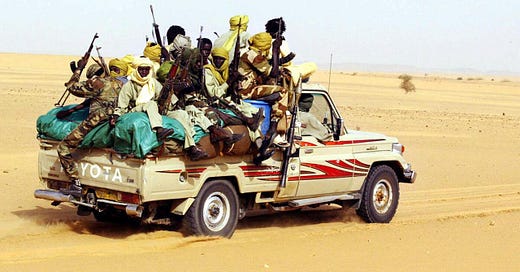




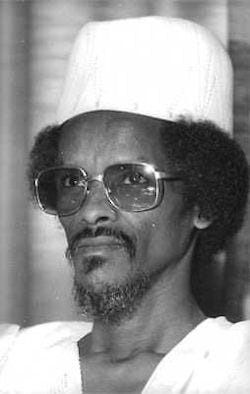


![Chad's troops during the war against Lybia in the 1980s [Wikimedia Commons] Chad's troops during the war against Lybia in the 1980s [Wikimedia Commons]](https://substackcdn.com/image/fetch/$s_!RwVB!,w_1456,c_limit,f_auto,q_auto:good,fl_progressive:steep/https%3A%2F%2Fsubstack-post-media.s3.amazonaws.com%2Fpublic%2Fimages%2F8ebc849f-3199-4dd7-b14a-88f4721167a0_1280x802.jpeg)




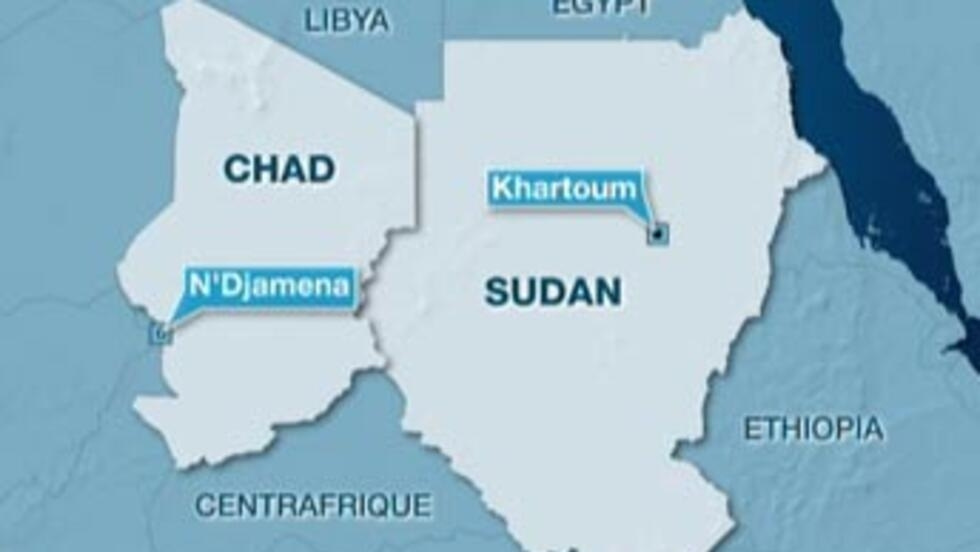
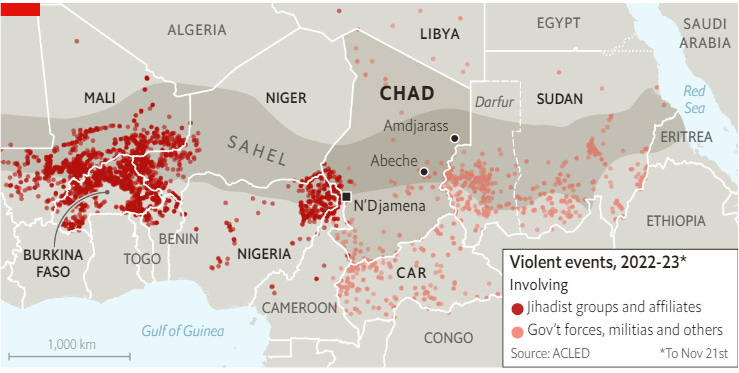
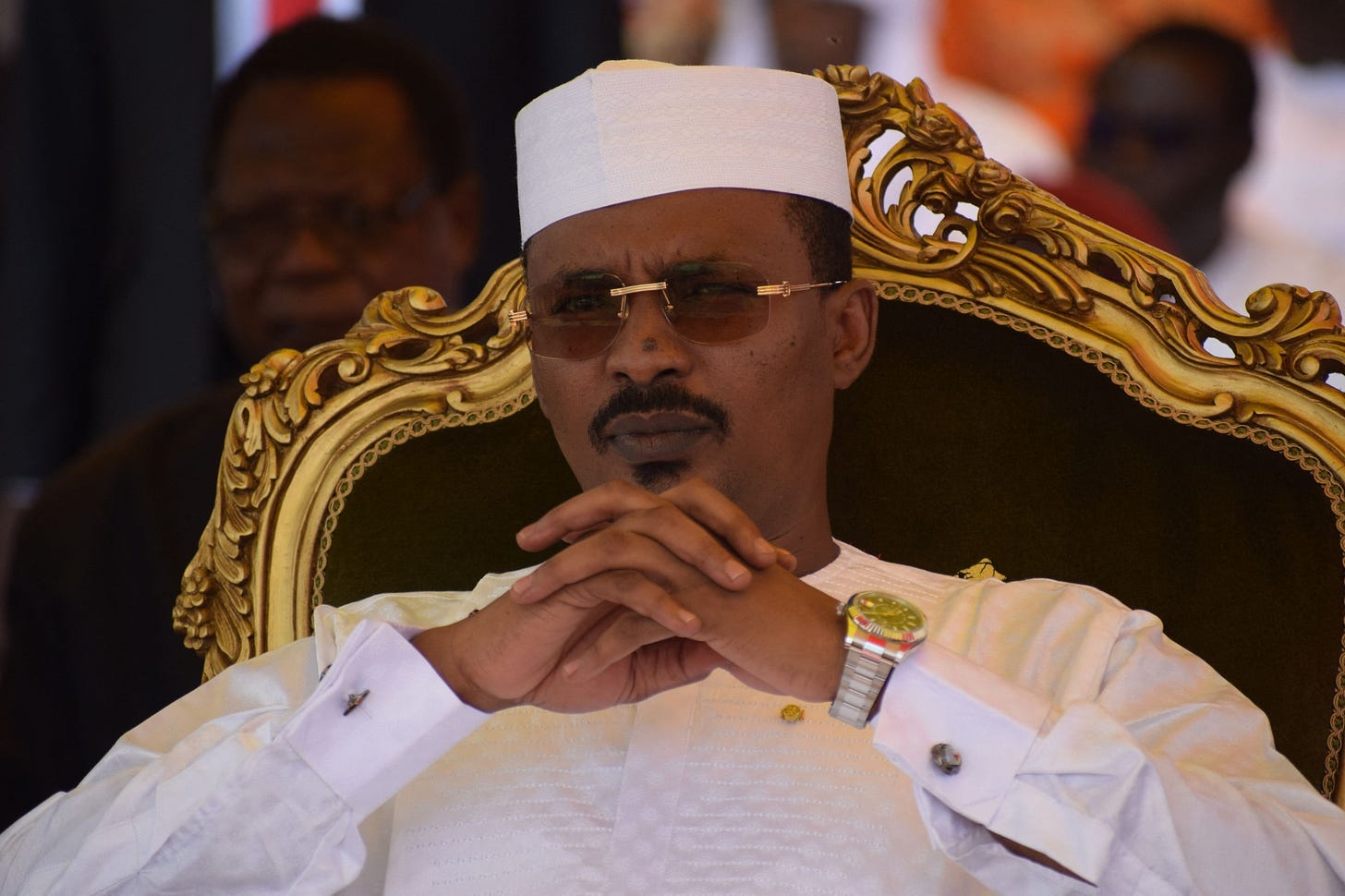
Hi Yaw, I’ve been following and reading your articles for a while now and have learnt a huge amount. Thank you for putting so much time, energy and care into them. I’m not the best at navigating the site and have been looking for a way to support/show my appreciation - if you are accepting donations or anything similar please let me know and I would be grateful to show my thanks that way. Best, Felix
Forgive me, I don't know a lot about geopolitics and the like, but i was curious about the part talking about Chinese and Taiwanese help to Chad. It seems odd to me that two very foreign countries would basically be competing which can provide
more aid. For Taiwan it kinda makes sense since they were supported, but China? And even then, why do global superpowers care to invest lots of resources into countries just to be 'recognised' by them? I imagine it's to do with Chads natural resources and labour force but i dont see the direct connection.
(also great article as always)